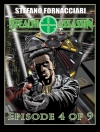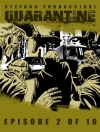This is a story of family love and loss, joy and tragedy, set against a background of contemporary terrorism. It is particularly relevant today. The heroine, Elizabeth Stern, is an affluent pediatric surgeon, whose husband and child are killed in the Athens Airport massacre, at the end of their vacation there. The little terrorist is Nadja, a little girl, the sole survivor of an exploding automobile, who is brought into the doctors operating room, in upstate New York, after Elizabeth pulls herself together enough to return to work. Elizabeth functions like an automaton, devoting her life completely to her medical work, until she sees in Nadja a resemblance to her own daughter, and the girl becomes more than just another patient to her. She vows to save the girl, especially because she had no opportunity to save her own child. Gradually she begins to love Nadja, fantasizing that nobody will come for the girl and she will be able to take her home, put her into her daughters room, and have someone to love again. The antagonist (initially) and love interest is David Hashemi, an FBI agent of Lebanese background, who is assigned to the hospital because the FBI has discovered that the same plastique that blew up the World Trade Center was in the car that exploded. At first, Elizabeth is hostile to him. She does not like the FBI, resents their campus harassment during the Vietnam War, is horrified by the WACO incinerations, and fears that they will take Nadja away from the hospital. Gradually, against her will, Elizabeth falls in love with David, as she finds that he is a good man; noble, caring, and brave, who needs love as much as she does. The major figures at the hospital are :1) Clifford Grubman, the Hospital President, who is romantically interested in Elizabeth and 2) Molly Quinn, Elizabeths assistant nurse, who is Elizabeths best friend and forces her to stay alive after the Athens massacre. The FBI remains at the hospital to keep Nadja under surveillance while waiting for her to regain consciousness, so that they can ask her about the cars destination. Certain that a backup team will come to replace the people blown up in the car, Hashemi says that it is essential to find the target to be bombed. Nadja is also under surveillance by other terrorists, who are hidden around the hospital and want to make sure that she does not divulge any information to the Americans. During the following weeks, there are a number of dramatic confrontations. Hospital personnel and FBI agents are killed in their attempts to protect the girl. Hashemi decides that she must be moved and she and a nurse, Molly, are taken over night to Elizabeths house. Dr. Grubman is tortured and murdered when he can not divulge where Nadja is taken, when shes moved from the hospital. However, before she can be moved again, she is kidnapped, Molly is injured and another FBI agent is killed. Interrogating a woman arrested in a raid, Hashemi discovers that Nadja is to be used as a human bomb, like a kamikaze pilot or a suicide bomber, and that the target is the U. S. President, who will be arriving at Stewart Airport to pay a visit to Franklin Roosevelts legendary house in Hyde Park. Hashemi tells Elizabeth that she must accept Nadjas inevitable death and forbids Elizabeth to come to the airport on the day of the confrontation. They quarrel violently about this and that morning, as soon as he is gone, Elizabeth drives herself to Stewart Airport. When she sees Nadja out on the tarmac, she runs toward her, determined to save her. In the ensuing conflagration at Stewart Airport, the gang of terrorists is captured, Nadja and Elizabeth are saved, but Hashemi loses a leg running to protect them. He is angry and bitter and irrationally blames Elizabeth and Nadja for his loss. He is a hero, will be decorated and will be given a desk job by the FBI, but he is, as might be expected, inconsolable. Although Hashem
عن المؤلف
Dr. Sheila Schwartz, professor emeritus from SUNY, has published fifteen books, including the mainstream novels The Solid Gold Circle and Sorority, and the young adult novels Growing Up Guilty and Like Mother, Like Me, which was made into a film with Linda Lavin and Kristy Mc Nichol. Her writing and teaching encompass a variety of categories, including novels, short stories, nonfiction, and children’s books. She has published over a hundred articles and book reviews, which have appeared in The New York Times Book Review, The Nation, and Psychology Today, among other publications. She wrote and produced an award winning documentary film in France, The Children of Izieu.
She has taught writing and literature at every age level, received the New York State/UUP Medal for Overall Excellence, two New York State English Council Awards for Excellence in Teaching and Writing, is a member of PEN, and was a Fulbright Scholar in Ireland.












